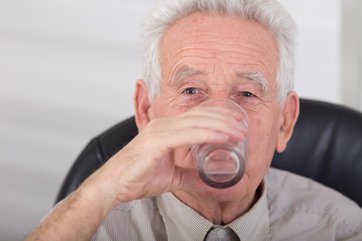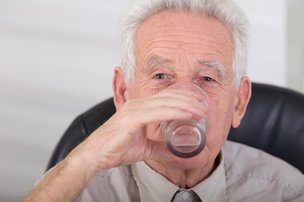
According to the British Geriatrics Society (BGS) "The UK DRIE Study found 20% of residents in UK long term care were dehydrated."
Due to natural physiological changes as a result of the ageing process, older people are at higher risk of becoming dehydrated. This is why older people and their Carers must be aware of the risks associated with it, and ways that it can be prevented.
When does dehydration occur?
Did you know that 75% of our body is made up of water? Our bodies require this water to be able to function and, without it, we would not be able to survive. Water can be found inside cells, between cells and within blood vessels. Our clever water management system aims to keep our water levels balanced; when it requires more our thirst mechanism sends us a signal that we need to intake more fluid.
We lose fluid throughout the day through various ways such as sweating, breathing, urinating and defecating. This means that our body requires us to replenish the water that has been lost.
Dehydration occurs when a person loses more water than they intake. When this begins to happen, the body will move water around our body to the areas that it is needed most.
What are the warning signs of dehydration?
The initial symptoms of dehydration are darker urine & decreased urine production. Thirst is also usually an early sign of dehydration, yet for some older people, this may not be the case.
Should dehydration persist, it is common to notice the following:
- Dry mouth, tongue and lips
- Unusual drowsiness
- Cramping in the limbs
- Dizziness
Once the body has lost between 10-15% of it's water, a person is considered to be severely hydrated and may show the following signs:
- Sunken eyes
- Dry papery skin
- Irritability and difficulty sleeping
- A weak, but rapid pulse
- Delirum
- Unconsciousness
What are the main causes of dehydration in older people?
The most common cause of dehydration in older people is obvious - simply not drinking enough water! There is evidence to suggest that as people age their ability to determine and to respond to thirst decreases which can lead to a higher likelihood of them not drinking enough.
Other well known causes of dehydration is older people are:
- Diarrhoea & vomiting - The large intestine absorbs water from food, but diarrhoea prevents this from happening due to excreting too much water. Vomiting leads to a loss of fluids and makes it difficult to replace water by drinking it.
- Excessive sweating - The body's cooling mechanism releases a lot of the bodies water. Hot weather and exercise can cause the body to sweat more meaning that more water is lost.
- Diabetes - Due to high blood sugar levels, a person with diabetes is likely to urinate more regularly leading to fluid loss.
- Medications - It is quite normal for older people to be on more than 1 medication at a time and some may cause increased sweating.
- Decreased kidney function - Our bodies tend to lose kidney function as we age meaning that we less able to conserve fluid.
What are the risk factors of dehydration?
If dehydration is left untreated, it can cause very serious implications including the following:
- Low blood volume - can be life-threatening as a decreased volume of blood results in low blood pressure as well as a reduction in the amount of oxygen reaching tissues.
- Heat injury - can be heat exhaustion, or a heat stroke.
- Seizures - caused by an imbalance of electrolytes.
- Kidney Problems - kidney stones, urinary tract infections (UTI's) & potentially kidney failure.
How can we prevent older people from becoming dehydrated?
Staff training - Residential care home and home care agency staff should be provided with training on how to ensure that their residents/clients are adequately hydrated.
Ensure that an older person always has access to a drink - The Carer of someone receiving home care who is wheelchair-bound can place a drink somewhere that is accessible to them during their visits.
Offer to assist the person should they need help drinking - Some people have limited strength & mobility which hinders their ability to drink unassisted. Offering assistance to these people could prevent them from becoming dehydrated.
Suitable cup to drink from, or a straw - Specially designed cups or a simple straw may make drinking an easier task for some people. If this is the case, ensure that the person is in possession or is provided with these.
Offering a choice of drinks - Sometimes, people find drinking water boring and will, therefore, decline the offer of a drink. Having the option of a few different drinks, both hot and cold, can make drinking that little bit more enjoyable.
Avoid offering too much caffeine or alcohol - Consuming too much caffeine or alcohol is not be good for older persons' health and could promote dehydration.
Remind older people to increase their fluid intake during warmer seasons - Along with warmer, humid weather comes a higher risk of becoming dehydrated due to a loss of water through sweating.
Jellydrops - Remembering to drink can be a huge issue for someone who is living with dementia. Jellydrops have come up with the idea of creating hydrating treats for people with dementia to prevent them from becoming dehydrated.
Hydration is key to living a healthy lifestyle - please make sure you're drinking your 8 glasses of water a day!
Are you looking for care for a loved one? Please don't hesitate to contact our friendly team today for complimentary assistance!
Call us on 01865 638018
Send message

